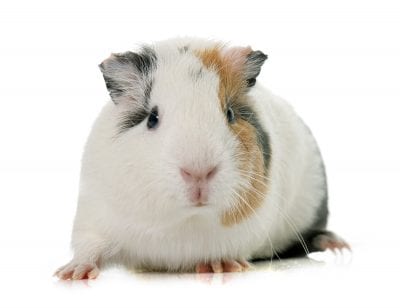Guinea pig is a name that doesn’t really match the animal – it’s neither a member of the pig family, nor is it from Guinea. Also known as “cavies”, guinea pigs are short-tailed South American rodents from the Caviidae family. According to the American Cavy Breeders Association, there are 13 breeds and 10 basic colors, with coats ranging from short coats to luxuriously long locks to hairless.

Since March is Adopt a Rescued Guinea Pig Month, we’d like to share reasons why you should consider adopting a rescued guinea pig.
Guinea pigs make great pets for people of all ages. These adorable little guys are friendly and fairly hardy, especially when they get regular preventive care. Guinea pigs make perfect indoor pets, and don’t require a lot of maintenance, so they’re a good option for those who aren’t ready for/cannot keep a larger animal like a cat or dog. (Hint: they’re the ideal first pet for little folks.)
Guinea pigs are hardy animals that live around 5-7 years. There’s good reason why guinea pigs are so often elementary school class pets – when they’re cared for properly and fed the right foods, they tend to be very healthy and don’t require a lot of maintenance. They’re not nearly as fragile as rabbits, and far less skittish than hamsters and gerbils, and they’re fun to watch as they run around!
Guinea pigs really like their people! Believe it or not, these little guys will bond with their owners and learn to recognize them, often running to the edge of the cage to greet their owner with a squeal of delight and recognition. When excited, young guinea pigs may also “pop” – jumping up into the air over and over, or running back and forth while squealing and kicking their legs. Pick them up and give them a cuddle – they might even purr!
Ready to adopt a guinea pig? To find a rescue location near you, please visit http://adopt.guineapigtoday.com

